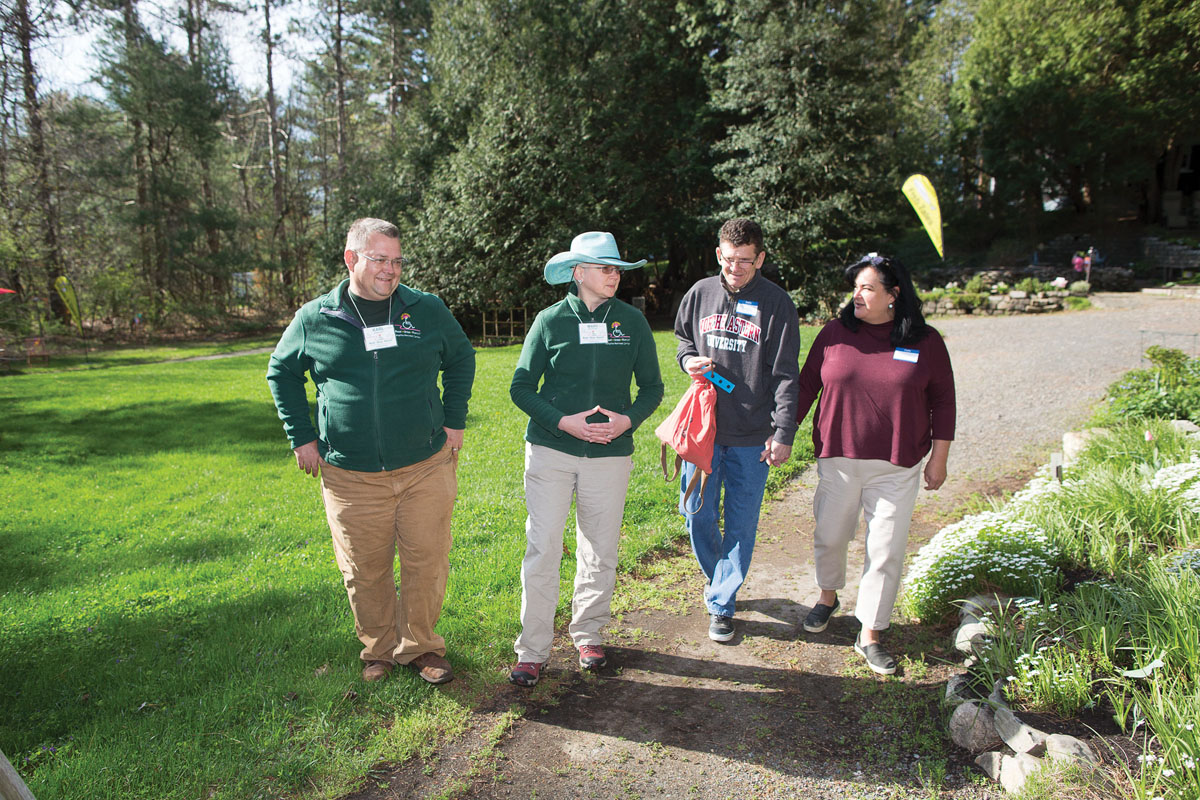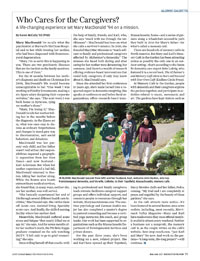Alumni Gazette
 IN BLOOM: MacDonald (second from left) and her husband, Karl, welcome John Hanlon, who has frontotemporal dementia, and his wife, Collette, to their Topsfield, Massachusetts, memory café. (Photo: Scott Eisen/AP Images for Rochester Review)
IN BLOOM: MacDonald (second from left) and her husband, Karl, welcome John Hanlon, who has frontotemporal dementia, and his wife, Collette, to their Topsfield, Massachusetts, memory café. (Photo: Scott Eisen/AP Images for Rochester Review)Mary MacDonald ’94 recalls what the psychiatrist at Harvard’s McClean Hospital said to her while treating her mother, who had been diagnosed with frontotemporal degeneration.
“Mary, I’m so sorry this is happening to you. There are two psychiatric illnesses that are the hardest on the family members. This is one of them.”
For the 18 months between her mother’s diagnosis and death on Christmas Eve 2008, MacDonald’s life would become unrecognizable to her. “One week I was working at Fidelity Investments, making a six-figure salary designing their corporate websites,” she says. “The next week I was back home in Syracuse, tying my mother’s shoes.”
“Mary, I’m losing it,” MacDonald recalls her mother telling her in the months before the diagnosis. As the illness set in, what was once easy to dismiss as ordinary forgetfulness and changes in mood gave way to disorientation, anti-social behaviors, and delusions.
MacDonald was her parents’ only child, and her father wasn’t well either. Her responsibilities required a geographic separation from her then fiancé—and now husband—Karl Ackerman. But when her mother experienced a bad fall, MacDonald returned to Boston, taking her mother along. While the Boston area boasts extraordinary medical services, she found that, in many ways, neither she, nor her mother, was well served.
“She basically experienced her end of life through several different health care facilities,” MacDonald says. She rattles them off. Acute care. Assisted living. Specialty acute care. And finally, the skilled nursing facility where her mother died.
Meanwhile, MacDonald suffered acute stress and fatigue “that nearly killed me at age 36,” she says. And for seven months after her mother’s death, the Phi Beta Kappa graduate remained on the sofa watching HGTV. “I left only to go to grief counseling,” she says.
Since willing herself off that couch—with the help of family, friends, and Karl, who, she says “stuck with me through the terribleness”—MacDonald has been on what she calls a survivor’s mission. In 2010, she founded MaryMac Missions to “teach self-care to family and professional caregivers affected by Alzheimer’s/dementia.” The stresses she faced both during and after caring for her mother were devastating, but common. And there’s a wealth of research offering evidence-based interventions that could help caregivers, if only they knew about it, MacDonald says.
Since she attended her first conference 10 years ago, she’s made herself into a respected expert in dementia caregiving. She speaks at conferences and before local organizations; offers research-based training to professional and family caregivers; leads retreats; facilitates caregiver support groups and offers individual support; and connects people to resources through her website, Marymacmissions.com. The one-time psychology and German double major has also completed a master’s degree in pastoral counseling and become a certified yoga instructor, life coach, and group leader. Her work has been supported by organizations such as the Massachusetts Department of Developmental Services and private donors.
For the past three years, she’s been working on a new, related project. She and Karl have opened up their Topsfield, Massachusetts, home—and a series of gardens along a wheelchair-accessible path they built in 2010 for Mary’s father—for what’s called a memory café.
There are hundreds of memory cafés in North America. But Mary and Karl’s Memory Café in the Garden has been attracting notice as possibly the only one in an outdoor setting—that’s according to the Santa Fe dementia care expert Jytte Lokvig, who featured it in a recent book, The Alzheimer’s and Memory Café: How to Start and Succeed with Your Own Café (Endless Circle Press).
At Memory Café in the Garden, people with dementia and their caregivers explore the gardens together, and participate in activities related to music, movement, and art. The gardens have kept visitors such as Darcy Morales-Zullo and her father, Pedro, coming. “My Dad and I are completely at peace and engulfed by the beauty of these gardens,” she says.
As the café attracts more notice—it’s been featured in several Boston-area news outlets, including, most recently, Merrimack Valley Magazine—Mary and Karl have made events they once offered monthly available almost every weekend. Neither a business nor a nonprofit, the memory café is, as the couple writes on the café’s website, Rest-stop-ranch.com, “just Karl and Mary” for now. And work on the gardens—“a long-term, life-long project”—will continue.

